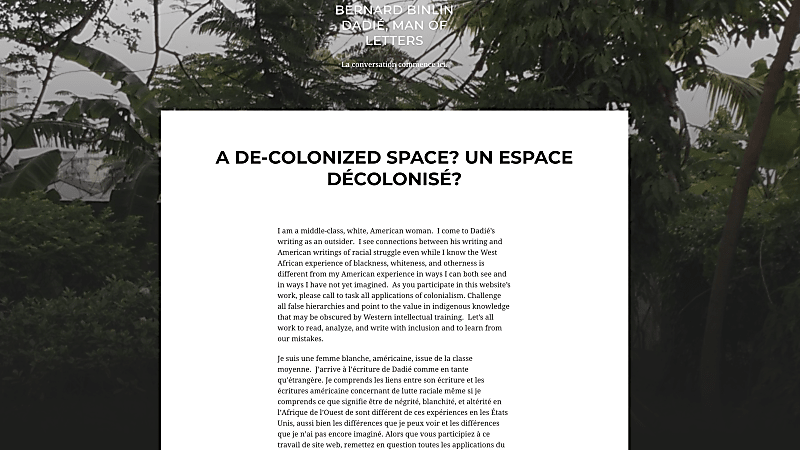Bernard Binlin Dadié: Man of Letters
Peggy Wright-Cleveland
A crowd-sourced, open access, bi-lingual, uncolonized digital space that celebrates the writing of Bernard Dadié, an Ivorian poet, playwright, and cultural leader.

Overview
The Dadié Project began as an online, open-access, crowd-sourced bibliography of works by and about Bernard Binlin Dadié meant to bridge the divide between Western scholarship and African scholarship. It is developing into a space for collaborative, crowd-sourced translation; open-access translations and scholarship; and a textual database of Dadié’s poetry. As relationships between scholars develop, and concepts of Western scholarship and African scholarship are more fully exchanged, the design of the project site will adapt and new collections of ideas will be curated.
Context
The identity housed in language is central to this project. Bernard Binlin Dadié was a black-skinned African raised under French Colonial rule. Dadié was educated in French Colonial and French Continental schools and wrote his poems, plays, memoirs, and essays in French. Yet, as a member of the Agni people, Dadié communicated in Agni (Anyi) first. Early in his career, Dadié elected to translate traditional African tales from Agni into French, suggesting his imagined audience for those words was Western and white, and demonstrating the value he placed on traditional culture. After twenty years in civil service, Dadié served as Minister of Culture in Côte d’Ivoire from 1977 – 1986 where he worked to craft a new continental, African identity and was recognized as a leader of French-language African citizenship.
In this project, I have three goals: first, to allow mono-lingual English speakers to also engage with Dadié’s language and ideas and, therefore, with West Africa; second, to identify ways a white, Western lens inhibits comprehension of myriad African ideas; finally, to point to what West African, Agni thinking offers that Western thinking needs to know. A handicap of the white, Western gaze is to believe it is a better view, worthy of universal adoption if only others were offered it. Instead, my interactions with Dadié and his spirit of pan-Africanism have brought to my attention new ways West Africa and America complement each other and I have no desire for one view to consume another.
